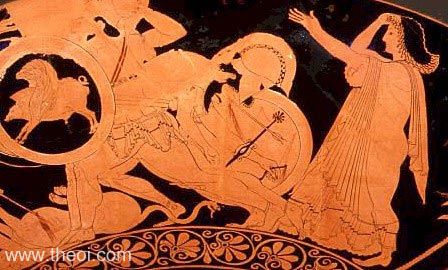KALLIRHOE
Greek Name
Καλλιρροη Καλλιροη
Transliteration
Kallirrhoê, Kallirhoê
Latin Spelling
Callirhoe, Calliroe
Translation
Beautiful-Flow (kalli-, rhoos)

KALLIRHOE (Callirhoe) was an Okeanid-nymph of the mythical western isle of Erytheia (sometimes identified as southern Spain). She was the mother by Khrysaor (Chrysaor) of the three-bodied giant Geryon.
Kallirhoe was probably either the Naiad-nymph of a spring or fountain of Geryon's town or a rain-bringing cloud-goddess.
PARENTS
OKEANOS & TETHYS (Hesiod Theogony 351; Homeric Hymn 2.417; Stesichorus Frag 587; Apollodorus 2.106)
OFFSPRING
GERYON (by Khrysaor) (Hesiod Theogony 287 & 980, Stesichorus Frag 510, Apollodorus 2.106, Hyginus Pref & Fabuale 151)
ENCYCLOPEDIA
CALLI′RRHOE (Kallirroê). A daughter of Oceanus, who was the mother of Geryones and Echidna by Chrysaor. (Hesiod, Theog. 351, 981; Apollod. ii. 5. § 10.) By Neilus she was the mother of Chione, and by Poseidon of Minyas. (Serv. ad Aen. iv. 250; Tzetz. ad Lycoph. 686.)
Source: Dictionary of Greek and Roman Biography and Mythology.
CLASSICAL LITERATURE QUOTES
Hesiod, Theogony 287 ff (trans. Evelyn-White) (Greek epic C8th or 7th B.C.) :
"Khrysaor (Chrysaor), married to Kallirhoe (Callirhoe), daughter of glorious Okeanos (Oceanus), was father to triple-headed Geryon."
Hesiod, Theogony 346 ff :
"She [Tethys] brought forth also a race apart of daughters, who with lord Apollon and the Rivers have the young in their keeping all over the earth, since this right from Zeus is given them. They are . . . Rhodeia and Kallirhoe (Callirhoe) [amongst 41 named] . . .
Now these are the eldest of the daughters who were born to Tethys and Okeanos (Oceanus) . . . and all alike they look after the earth and the depths of the standing water."
Hesiod, Theogony 966 & 979 ff :
"Sing out now the names of those goddesses who went to bed with mortal men and, themselves immortal, bore to these children in the likeness of immortals . . . Kallirhoe (Callirhoe), daughter of Okeanos (Oceanus), lying in the embraces of powerful-minded Khrysaor (Chrysaor), through Aphrodite the golden bore him a son, most powerful of all men mortal, Geryones."
Stesichorus, Geryoneis Fragment 511 (trans. Campbell, Vol. Greek Lyric III) (C7th to 6th B.C.) :
"The mighty son [Geryon] of immortal Khrysaor (Chrysaor) and Kallirhoe (Callirhoe)."
Stesichorus, Geryoneis Fragment 512 :
"And seeing him [Geryon] coming she [Kallirhoe (Callirhoe)] addressed him : ‘Strength ruins victory--obey me, my child.’"
Stesichorus, Geryoneis Fragment 513 :
"[Kallirhoe (Callirhoe) begs her son Geryon not to fight Herakles :] ‘I , unhappy woman, miserable in the child I bore, miserable in my sufferings; but I beseech you, Geryon, if ever I offered you my breast--at your dear mother's side, gladdened--by your feasting.’ With these words she opened her fragrant robe."
Stesichorus, Geryoneis Fragment 587 :
"Geryon is the son of Kallirrhoe (Callirrhoe), daughter of Okeanos (Oceanus), and Khrysaor (Chrysaor)."
Pseudo-Hyginus, Fabulae 151 (trans. Grant) (Roman mythographer C2nd A.D.) :
"From Medusa, daughter of Gorgon, and Neptunus [Poseidon], were born Chrysaor and horse Pegasus; from Chrysaor and Callirhoe, three-formed Geryon."
SOURCES
GREEK
- Hesiod, Theogony - Greek Epic C8th - 7th B.C.
- Greek Lyric III Stesichorus, Fragments - Greek Lyric C7th - 6th B.C.
ROMAN
- Hyginus, Fabulae - Latin Mythography C2nd A.D.
BIBLIOGRAPHY
A complete bibliography of the translations quoted on this page.